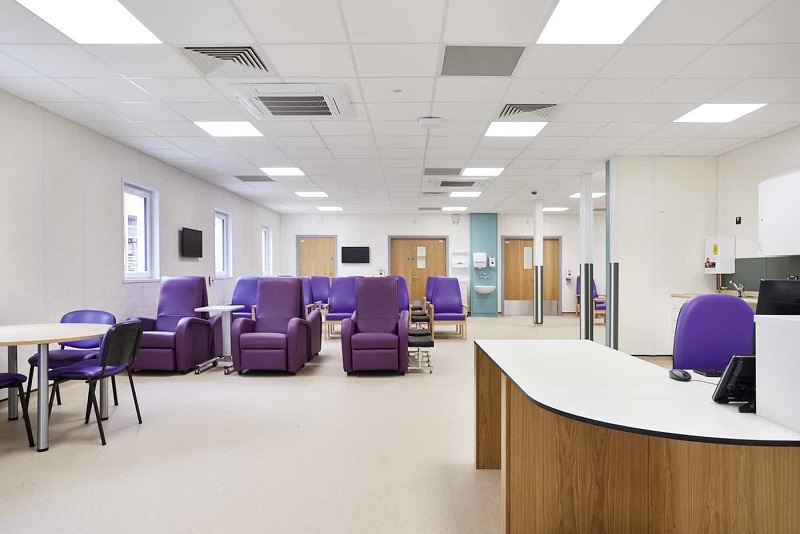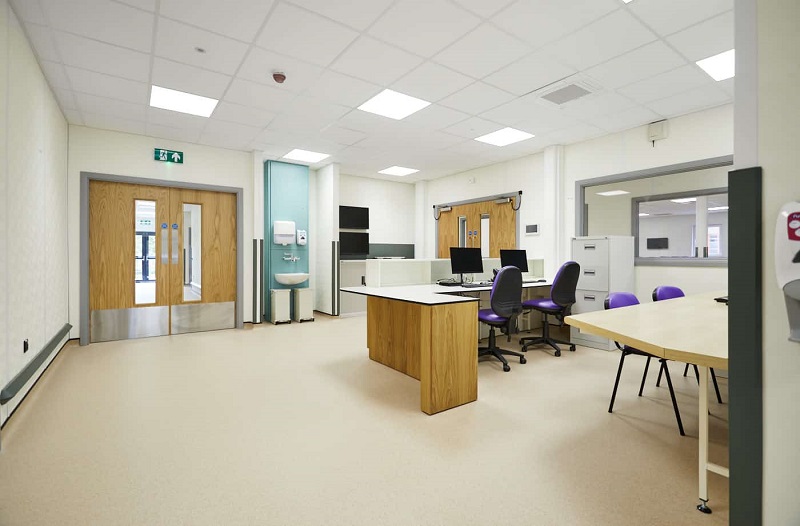Dorset County Hospital urgently needed a new modular building to improve facilities for staff, patients, and visitors, while on a strict budget and working to tight deadlines.
Addressing the escalating challenges posed by the rising number of patients, Dorset County Hospital NHS Foundation Trust took a pro-active step to tackle the mounting pressures on its services.
With increased patient numbers leading to ambulance and discharge backlogs, the trust recognised the urgency for a solution.
And, in February this year, a decisive move was made to invest in a new building, aiming to streamline patient stays, enhance discharge efficiency, and alleviate pressures on emergency departments.
Time was of the essence, with the trust’s government funding bound to financial year deadlines.
So, Premier Modular was enlisted to engineer a high-performance, accelerated remedy that could address immediate, and future, demands.
Expediting the design process within budget
Navigating within tight financial constraints, Premier Modular joined forces with the trust, cost consultants, and P+HS Architects.
Pioneering an agile approach, the team expedited the project through the initial five phases of RIBA’s Plan of Work in merely a week, a process that usually spans two months.
This impressive feat was followed by the development of a meticulous design management strategy, fuelled by daily consultations between Premier Modular and key stakeholders.
Collaborative efforts led to designs that balance functionality and budget
Budgetary constraints
Striving to create a state-of-the-art facility within financial limitations required innovative thinking and strategic planning.
Collaborative efforts of architects, engineers, and construction experts led to smart design decisions that balanced functionality and budget.
And modular construction techniques and efficient space use further maximised resources, ensuring both quality and cost effectiveness. But this endeavour went beyond construction.
Long-term planning ensured ongoing operational costs remained manageable.
Fulfilling urgent needs
Amid the urgency to alleviate healthcare challenges, the swift implementation of this project became a critical mission.
With backlogs needing immediate attention, the deployment timeline took centre stage.
To ensure a seamless and rapid transition, planning and co-ordination became pivotal and every detail was scrutinised to ensure minimal delays.
The outcome was a carefully-orchestrated process that allowed the facility to swiftly come to life.
Consisting of 18 modules, the building was delivered within five months
Regulatory compliance
The creation of a healthcare facility demands meticulous attention to detail, ensuring every aspect of the design and construction aligns with the strict guidelines that govern healthcare infrastructure.
Rigorous reviews and assessments were conducted at every phase of the project to ensure alignment with regulatory benchmarks.
This approach not only addressed potential issues pro-actively, but also guaranteed that the facility would provide a safe and secure environment for both patients and healthcare professionals.
The results
Completed in July this year, the 650sq m permanent healthcare building is a symbol of innovative design and swift execution.
Consisting of 18 modules, it showcases composite panelling that safeguards and paves the way for future enhancements.
This adaptable design not only ensures protection, but also offers the potential for rain screen cladding, enhancing insulation and visual appeal.
Offsite solutions
By opting for offsite construction, Dorset County Hospital NHS Trust has significantly slashed both time and costs.
Unlike traditional onsite building, offsite construction happens in a controlled factory environment, eliminating weather-related delays and other uncertainties.
This means that various parts of the project can move forward simultaneously, drastically speeding up the entire process.
This efficient method translates to cost savings.
Precise planning and standardised processes in the factory cut down on material waste and labour hours, making the project in budget for the trust.

